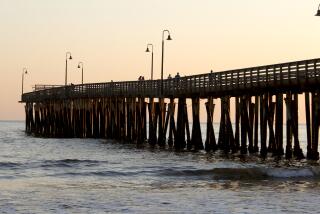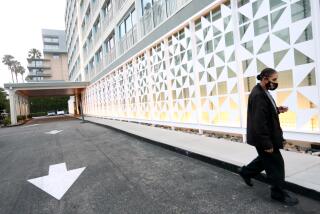Decisions on Bolsa Chica’s Future Loom in Huntington
- Share via
Like participants in an endless poker game, environmentalists and city officials may be about to play their final hand over the future of the Bolsa Chica wetlands.
Huntington Beach City Council members will decide later this month whether to launch talks to annex the famous 1,100-plus-acre stretch of coastland.
The risk for the council, which previously committed to preserving all of Bolsa Chica as open space, is whether annexation would cause it to be developed or kept pristine.
Some groups still have hopes of acquiring the land for public use, while others have resigned themselves to future housing. And some just want the whole issue to be finally resolved.
“If God is an environmentalist, annexation will end the struggle between man and nature on the issue of Bolsa Chica,” said Councilman Dave Garofalo.
The bulk of the swampy marshland was removed from play in 1997, when the state bought and agreed to preserve 880 acres of low-lying wetlands, some of the most fragile in Southern California.
Still remaining is 200 acres of grassland that rise above the estuary. That property is owned by Hearthside Homes Inc., previously known as Koll Real Estate Group.
Hearthside officials have seen their original vision of a luxury enclave of 6,000 homes, complete with marina, shrink to 1,235 homes on the grassy bluff.
The company is set to break ground later this year, provided it is granted favorable rulings in two pending appellate court decisions--one challenging the environmental study’s findings on a raptor habitat and one charging that public hearings on the matter were inadequate.
Should the company not come to agreement with the city over plans to develop the property, however, Hearthside will walk away from the deal, said Lucy Dunn, executive vice president and Hearthside spokesperson.
“Annexation will only make sense to us if an agreement can be negotiated that is fair to the city and fair to the future residents of [the mesa] and fair to us as landowners,” Dunn said.
The county already has a development agreement in place with Hearthside to build the homes, but the city’s annexation plans would allow it to negotiate several important changes, including a larger buffer around the wetlands, more park space or fewer homes.
The city holds one key leverage point: water. If the city chooses not to provide water to the Hearthside project, it could cost the developer up to $13 million to build a six-mile pipeline.
The city has another motivation to negotiate: It stands to earn about $2 million in developer and permit fees if the annexation occurs before the homes go up. If annexation comes after the homes are built, or if the county forces it on the city, it could cost the city hundreds of thousands of dollars in services.
“I’m between a rock and a hard place,” said Councilman Tom Harman. “I would like to see this remain open space and not have any development. . . . But if it is inevitable that there will be development, it would be natural and normal for the city to bargain. I think we should bargain with them if there will be development, which I’m opposed to.”
‘Hostile Annexation’ Could Cost City
Councilman Dave Sullivan, another adamant member of the open-space faction, said he hoped negotiations could buy more time to find a public agency to buy the mesa before the homes go up.
He worries, though, about a “hostile annexation” down the line, given the urging of the county to have all unincorporated county pockets be attached to a city in the future. That could cost the city money.
“We still stay in the driver’s seat with the water issue,” Sullivan added. “The only thing mitigating against it is this hostile-annexation threat.”
To the environmentalists fighting against development, a gated community on the bluff would be a permanent threat to the Bolsa Chica ecosystem.
“They need to step back for a minute and think about what this place will look like in 30 years,” said Paul Horgan, president of the Bolsa Chica Land Trust. “What will our legacy be? Will it be concrete on the whole coast or will we leave something for the children?”
Along with the habitat for raptors--some species of which may be nearing threatened status--the mesa is a premier archeological site, with centuries of Native American history buried under its dirt, some say.
Horgan says the Land Trust has only about $70,000 in its bank account, and his and other groups such as Amigos de Bolsa Chica still hope a state or federal agency will buy the land.
The sticking point has always been that public agencies insist on negotiating only with willing sellers when it comes to buying land.
And Hearthside officials are not willing sellers.
Even if a sale could be negotiated, the land--valued at $135 million--may be too steep for state and federal agencies that have other resources vying for their dollars.
Councilman Garofalo declared the annexation a “no-brainer,” given the financial analysis.
“I’ve always thought that it was the city’s arrogance that caused the developer to break off negotiations for annexation 20 years ago,” he added. “Now, we have a simple choice: Annex Bolsa Chica voluntarily and have the city benefit by $2 million, or have it annexed involuntarily and lose a half-million dollars for the rest of our lives.”
The City Council is set to debate the annexation at a public workshop, which begins at 5 p.m. Feb. 22 in the City Council chambers at 2000 Main St.
(BEGIN TEXT OF INFOBOX / INFOGRAPHIC)
Annexing Considered
Huntington Beach officials will meet this month to decide their approach to the idea of annexing 200 acres of Bolsa Chica wetlands.
Bolsa Chica bluff, 200 acres
State wetlands, 880 acres










